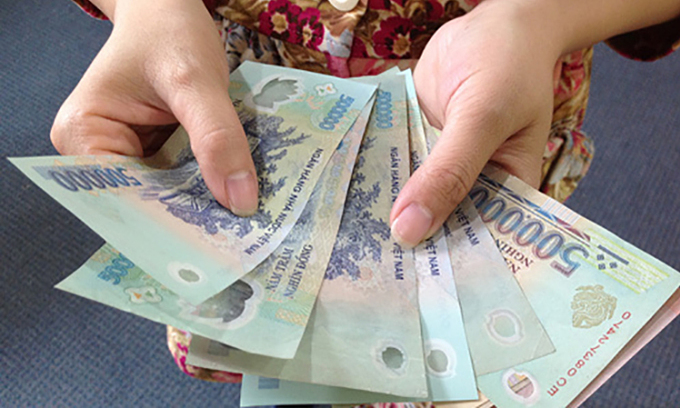
Every year, Tien Thanh exhausts his entire savings during Tet, driven by the belief in the old Vietnamese adage: "You must be full for three days of Tet even if you’re poor.”
As a salaried employee accustomed to frugality, the 30-year-old from Que Vo in Bac Ninh province undergoes a noticeable transformation during the Lunar New Year (Tet) holiday season.
Upon returning home for Tet, Thanh often splurges on new furniture for his parents, sometimes spending thousands of dollars. He also distributes lucky money to neighborhood children, all in high denominations.

Many people like to boast about unique, expensive items to "show off their class" during Tet. Illustration photo by N.P
There are instances where Thanh, influenced by his neighbors' purchases, indulges in buying new items like dehumidifiers, air conditioners, and even a grandfather clock. He admits to enjoying the compliments he receives during the holiday season, such as being praised for being a dutiful son who provides well for his parents during Tet.
In addition to the joy of shopping, Thanh frequently hosts parties and gatherings with friends, further depleting his savings until they're entirely exhausted by the end of the holiday.
For Thanh, the amount spent to maintain appearances among friends, neighbors, and relatives is deemed worthwhile, regardless of the financial strain it imposes.
Similarly, Mai Lien's post-Tet wallet often ends up empty. Despite her family's modest needs in Thai Binh province, the 36-year-old fills her fridge to capacity, preparing lavish feasts daily for ancestral offerings. However, due to the limited number of family members, much of the food goes to waste.
Lien typically spends at least VND40 million ($1,637) for Tet, including VND20 million distributed evenly between both sides of her family, with additional expenses on lucky money for relatives often exceeding VND10 million. This total expenditure often surpasses both hers and her husband’s annual work bonuses.
Despite her husband's repeated pleas for financial prudence, Lien maintains that only through lavish spending on Tet preparations can they secure the luck necessary for a prosperous new year.
Psychologist Trinh Trung Hoa explains that Thanh and Lien's extravagant Tet practices stem from ancient traditions. In the past, regardless of economic status, individuals endeavored to celebrate Tet abundantly, hoping to carry this prosperity throughout the year.
"When Tet arrives, people not only fill their stomachs but also seek fortune through feasting," Hoa elaborates, underscoring why many overspend during this time.
Furthermore, Hoa notes that the desire to flaunt unique and expensive items contributes to overspending, often fueling jealousy among those without such luxuries.
According to a report by Milieu Insight, 52% of respondents across Southeast Asia anticipated higher spending for the current year's Lunar New Year, with Vietnamese and Thai participants displaying a greater inclination towards lavish expenditures.
Similarly, Meta's report revealed a significant increase in average Tet spending for 2023, particularly among Gen Z and Millennials, who view Tet as an opportunity to explore new product categories.
Associate Professor Dr. Do Minh Cuong, Deputy Director of the Vietnam Association of Business Culture Development, acknowledges that Tet shopping drives economic growth but emphasizes the importance of prudent spending.
Without a clear financial plan, individuals risk falling into reckless spending habits, as evidenced by Thanh's reliance on loans in the past two years to cover post-Tet debts.
To mitigate such situations, Dr. Cuong suggests limiting Tet budgets to the "13th-month salary" tradition or devising a clear financial plan at the start of the year, emphasizing the need for responsible spending tailored to each individual's financial capacity.
In conclusion, Dr. Cuong advises that while Tet celebrations hold significance, meticulous planning is essential to avoid financial strain and debt burdens post-Tet.
Hãy là người đầu tiên bình luận!
Bình luận: